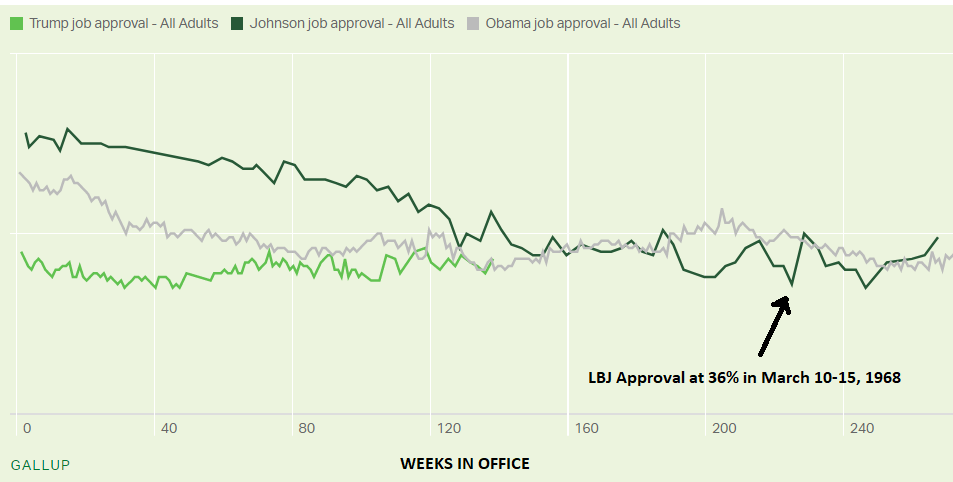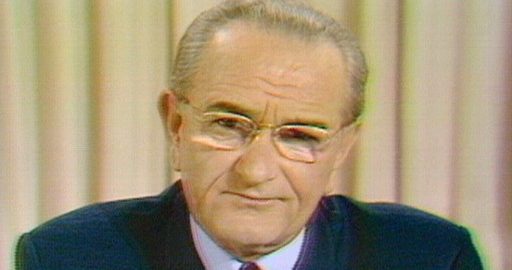By Kent R. Kroeger (NuQum.com, October 4, 2019)
It was the evening of March 31, 1968. President Lyndon Johnson, nearing the end of a televised speech to the nation regarding the Vietnam War and the administration’s accelerated effort to organize peace talks with the North Vietnamese, dropped this political bomb on the American people:
“I have concluded that I should not permit the presidency to become involved in the partisan divisions that are developing in this political year,” Johnson said. “With America’s sons in the fields far away, with America’s future under challenge right here at home, with our hopes and the world’s hopes for peace in the balance every day, I do not believe that I should devote an hour or a day of my time to any personal partisan causes, or to any duties other than the awesome duties of this office — the presidency of your country. Accordingly, I shall not seek, and will not accept, the nomination of my party for another term as your president.”
Apart from his wife and few close advisers, including Vice President Hubert Humphrey, LBJ’s political denouement was a shock to almost everyone that knew him.
No president loved the art of politics more than LBJ. The journey in passing landmark legislation was, in many ways, more important to him than the legislation itself. The greatest pieces of legislation passed during his administration — Civil Rights Act (1964), Economic Opportunity Act (1964), Immigration Reform Act (1964), Social Security Amendments (1965), Voting Rights Act (1965)—to this day stand as living monuments to this country’s last successful activist president. Almost every substantive domestic policy debate today (Medicare, immigration, voting rights) centers on legislation passed as part of LBJ’s Great Society and War on Poverty initiatives.
Which is why LBJ’s decision not to seek re-election in 1968 surprised many Washington, DC elites. Granted, his approval ratings at the time were in steady decline, sitting at 36 percent according to a Gallup Poll conducted right before the March 31st speech (see Figure 1). His fall with the American public was due, in large part, to the worsening war in Vietnam. Still, as recently as January 1968, LBJ’s approval ratings had stood at 48 percent — a number President Donald Trump would kill for today. (Literally, I believe Trump would kill to have 48 percent approval.)
Figure 1: Presidential Approval for LBJ, Barack Obama and Donald Trump (by weeks in office)

Should I stay or should I go?
Historians generally explain LBJ’s decision not to run for re-election in 1968 in the growing discontent over the Vietnam War and the political strength demonstrated by anti-War Democrats, such as Minnesota Senator Eugene McCarthy, who received 42 percent of the vote to LJB’s 49 percent in the March 12th New Hampshire primary. When New York Senator Robert Kennedy joined the Democratic nomination race on March 16th, LBJ knew his path to the nomination was precarious — a nearly unprecedented position for an incumbent president.
Also burdening the 59-year-old LBJ in early 1968 was his health, Vice President Humphrey recalling that the president told him before the March 31st speech that “all of the men in his family had died in their early sixties or before.”
Nonetheless, LBJ had many good reasons to run for re-election. The economy was strong under his stewardship. Since his election in 1964, the U.S. experienced real annual GDP growth rates of 8.5 percent, 4.6 percent, and 2.7 percent; and in the election year of 1968, the economy grew at a torrid 5.0 percent. Economic growth under Trump has been half that as under LBJ (2.6 percent vs. 5.2 percent, respectively).
Besides perhaps JFK, no politician was a more important advocate for the U.S. space program than LBJ. In March 1968, barely a year removed from the Apollo 1 tragedy when three astronauts died preparing for the first Apollo mission, LBJ knew man’s first landing on the moon would occur in Summer 1969. He wanted to be president at that moment.
“No one did more than LBJ to commit the U.S. to landing men on the moon and returning them safely to earth,” writes former President Bill Clinton speechwriter Jeff Shesol. “It was John F. Kennedy, of course, who issued that call, but only after Johnson had led the charge for years.”
Yet, all things considered, LBJ decided not to run for re-election.
And history has remained mixed on his legacy and place among the pantheon of American presidents.
How is LBJ relevant to Donald Trump?
There are major differences between what LBJ faced in March 1968 and Donald Trump faces in October 2019.
For one, LBJ wasn’t facing impeachment. Secondly, Donald Trump is not facing a serious challenge to his nomination. The 2020 Republican candidacies of Mark Sanford, Bill Weld, and Joe Walsh will be remembered for their negligible importance, not their threat to Trump’s control over the Republican Party.
Donald Trump will win the Republican nomination in 2020, if he chooses to compete. But should he compete for it?
The combination of Trump’s pathological vanity and insecurity puts his odds of running for re-election very high. At the same time, he has repeatedly demonstrated enough self-awareness to know when he needs to back down.
When Fox News’ Megyn Kelly confronted candidate Trump on his history of bimbo-laden insults of women, he apologized quickly. Trump is far less confrontational than many assume.
Trump knows when he’s facing insurmountable odds, even if his instincts on the proper tasks he can ask world leaders to do for this re-election efforts may be imperfect.
Trump’s requests of Ukrainian President Volodymyr Zelensky and Chinese leader Xi Jingping to investigate Joe and Hunter Biden are unequivocally over the line of presidential propriety. If Trump doesn’t realize it now, he will soon. His double-down, over-the-top defense of his behavior offers evidence that he already understands the gravity of his mistake.
President Donald Trump will be impeached by the U.S. House and anyone assuming the U.S. Senate won’t convict is living in a thought bubble of their own design.
Which is why LBJ’s case is so important and why President Trump needs to look closely at what the 36th President decided at a critical time in U.S. history.
LBJ took a backseat to no president with respect to his ego and naked audacity. Even so, he knew when he had worn out his welcome in D.C. He knew when to call it quits.
Where Russiagate was built on half-truths, conjecture and innuendo, the Trump administration’s actions with Ukraine and China regarding investigations into the Biden family is based on Trump’s own admissions. The evidence is already stacked against him.
Henceforth, things are not going to end well if Trump decides to ride this political bull much longer. Someone in his inner circle must tell him that. And when they do, Trump will do the right thing to do — at least I can hope.
Trump should follow LBJ’s lead and remove his name from consideration for the 2020 Republican nomination for president.
It’s the right thing to do for his party. It’s the right thing to do for his legacy. It’s the right thing to do for the nation. It’s the only rational thing to do.
- K.R.K.
Send comments and criticisms to: kroeger98@yahoo.com
